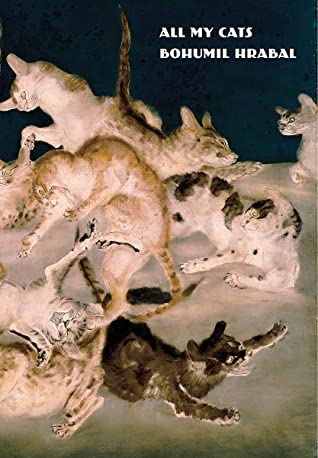
All My Cats
کتاب های مرتبط
- اطلاعات
- نقد و بررسی
- دیدگاه کاربران
نقد و بررسی

October 1, 2019
T.S. Eliot wrote, "The Naming of Cats is a difficult matter." So is the killing of them. Hrabal (Mr. Kafka: And Other Tales From the Time of the Cult, 2015, etc.) states at the outset of this memoir--set in 1983, 14 years before his death at 82--that he loved cats. At his cottage in Kersko, an hour's drive from Prague, he and his wife would open the door each morning, and "five grown cats would come charging into the kitchen and lap up two full bowls of milk." Then, "meshugge Stunde, this crazy hour" would begin: cats racing around the cottage, fighting over slippers, and so on. Hrabal loved "our children" so much that he'd dry their paws when they came in from the rain. But his wife often asked, "what are we going to do with all those cats?" The author had an upsetting answer: When two of them had five kittens apiece, he concluded that he had to "be the executioner" and control the population. So he lured six kittens into a mailbag, took it to the woods, and beat them to death. He feels this act was justified, yet those kittens "would haunt me like a bad conscience whenever I'd lie awake toward morning, unable to sleep." The feelings these killings engendered led him to write this thoughtful, if sometimes-repetitive, essay on the nature of guilt. Was he not like soldiers who killed innocents during wartime? Isn't killing just the nature of life, he argues, as when his two tabbies caught and tortured a bunny until it died of terror? This alternately sweet and gruesome memoir challenges readers to think about their own actions and their own vulnerability. Cats serve as a metaphor for the many forms of guilt each person carries and the challenges of rationalizing problematic behavior. Indeed, what is one to do with all those cats? A disturbing work that is deep but not inscrutable.
COPYRIGHT(2019) Kirkus Reviews, ALL RIGHTS RESERVED.

November 11, 2019
This slender volume from novelist Hrabal (1914–1997), originally published in 1983, is an affecting meditation on the joys and occasional griefs of sharing his life with a large group of cats. While working in Prague during the week, Hrabal constantly worries about the animals that inhabit—and which he’s allowed to completely overrun—his country cottage, and only upon returning there for the weekend can he feel relieved. Should anything happen to him or his wife, he frets, “Who would feed the cats?” So when a new litter brings the cottage’s feline population over capacity, and Hrabal rashly decides to kill several kittens, readers will be shocked. That he can keep them on his side afterward—by persuasively showing himself as appalled at what he’s done—is a testament to his storytelling skills. These include an ability to balance brutal moments with tender ones, as when relating how even his feline-averse wife “always looked forward to mornings, when we’d wake up and I’d open the door and five grown cats would come charging into the kitchen and lap up two full bowls of milk.” Hrabal’s involving and moving story will prod his audience to look more closely at their own relationships with other creatures.

























دیدگاه کاربران